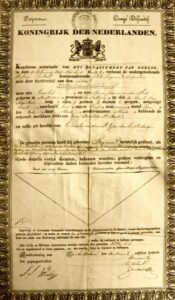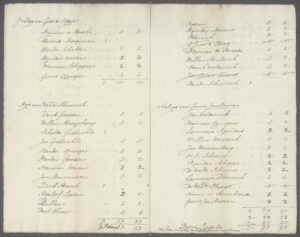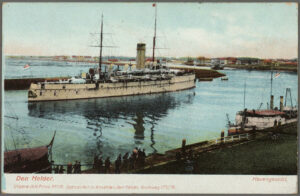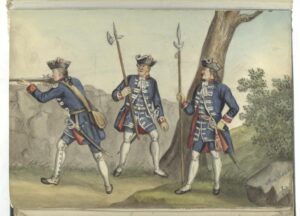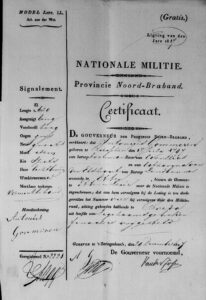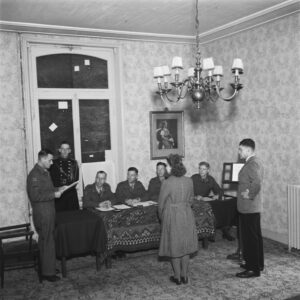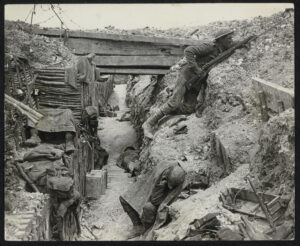This 1887 map shows the local militias ("schutterijen") for each municipality. Local militias were responsible for the defense of the municipality in case of trouble. Larger municipalities, marked with diagonal red hatching, had active local militias. The men serving in these militias would get regular training and exercises and could be called up at any time to help keep order. Other municipalities had inactive or resting militias. These men were reserves. They could be called up in … [Read more...]
Dutch term – Vaandrig
A vaandrig is an ensign, the lowest officer rank in the army. From the 1800s, the term is more specifically used for officers-in-training. The rank was also used in civil militias. You may come across the term in a range of records, including military records, church records, and town records. … [Read more...]
Dutch term – Stamboek
A stamboek is a military service register. Outside genealogy, the word stamboek is also used for a studbook, a register of the pedigree of purebred animals. This usage has led several genealogy websites, including Ancestry, to mistranslate the stamboek military records as "studbooks." … [Read more...]
Dutch term – Gepasporteerd
Gepasporteerd (literally: passported) means a passport was issued. You will typically come across the term in military service records in the 1800s. At the end of service, a soldier received a passport to show he fulfilled his military duties. Since these passports were given to the soldiers, they may have survived in private collections but are unlikely to turn up in archives. See the reader question about military passports in the 1800s for an example. … [Read more...]
Dutch term – Inkwartiering
Inkwartiering means billeting, when soldiers were quartered in civilian houses. This could happen during times of occupation. Town records may have lists of houses where soldiers were billeted, including compensation for expenses. Knowing your ancestors had soldiers billeted at their house can be useful in different ways. Apart from being an interesting piece of biographical information, it places your ancestor in a specific time and place, which can help to determine when they died or moved, … [Read more...]
Dutch term – Marine
The marine is the navy. The Royal Navy of the Netherlands has been involved with protecting and expanding Dutch interests around the globe. In the 1800s and 1900s, the navy played an important role in maintaining order in the Dutch colonies, including the Dutch East Indies, the Netherlands Antilles, and Suriname. Navy records have partially been destroyed. The surviving records can be found at the National Archives. … [Read more...]
Researching Military Ancestors in the Netherlands – Before 1795
I often get questions about finding military ancestors, and thought I would write a few posts about that. I will start with the early period, before 1795. Before 1795, most soldiers were professional soldiers, not conscripts. The Dutch Republic (1588-1795) hired both Dutch and foreign men. Often, whole regiments were hired, including from Scotland, Switzerland, and Germany. The regiments would be stationed in garrison towns throughout the republic, changing every few years. Some soldiers … [Read more...]
Dutch term – Vrijstelling
A vrijstelling is an exemption. You may come across the term in military enlistment registers or marriage supplements, if a person was vrijgesteld [exempted] from military service. Example: Antonie Gommeren's military exemption When Antonie Gommeren married Adriana Timmermans in Etten-Leur on 27 January 1828, he had to prove he had fulfilled his military duties. He submitted a certificate of National Militia that included the text "uit hoofde van ligchaamsgebreken finaal vrijgesteld" [received … [Read more...]
Dutch term – Krijgsraad
Krijgsraad means "court martial." You may find a reference to a court martial in your ancestor's military records if they made severe transgressions. If the person was sentenced to a prison sentence, prison records may also refer to the court martial verdict. Court martial records are typically kept in the regional historical center in the provincial capital. … [Read more...]
Dutch term – Loopgraaf
A loopgraaf is a trench. They were most famously deployed in World War I, when the Netherlands was neutral, but also in other wars. … [Read more...]



